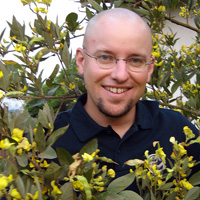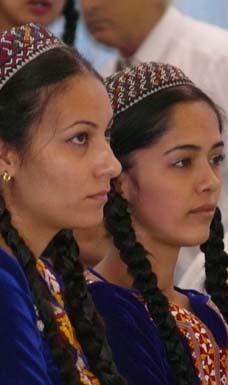
During my graduate work in sustainability I tried to figure out: "How do we evaluate a process of sustainable development?" I went to the Philippines as a Fulbright scholar and studied there. I wanted to continue working on sustainability after graduate school but I didn't want to be a professor with my Ph.D. - I wanted to do applied work. My wife and I decided that maybe it was a good time to volunteer. So we committed to the Peace Corps, which gave us the best opportunity to work with people directly over several years, and we ended up going to Paraguay.
Paraguay RPCV Justin Mog is assistant to the provost for sustainability initiatives at the University of Louisville
20 Minutes with Justin Mog
September 30th, 2009
Image
Justin Mog
Justin Mog is assistant to the provost for sustainability initiatives, a new post created to help the University of Louisville become more environmentally and socially responsible. Mog served with the Peace Corps in Paraguay for three years before coming to UofL this fall. He also has worked as an environmental educator at the University of Wisconsin-Madison, conducted research on sustainable agriculture in the Philippines and has interned at the Smithsonian Institution's Museum of Natural History. He talks about his goals for sustainability at UofL.
What interested you in the job here?
I saw a real potential to move UofL along. The path is open in many ways and the leadership is solid. A lot has already been started here. The ball is already rolling but there are still a lot of simple things we can do. There's a lot of low-hanging fruit around campus that we can pick to improve our sustainability. This will involve working with a whole lot of different people from a whole lot of different backgrounds and being a good facilitator - bringing people together around a common goal, yet honoring their individual interests and enthusiasms.
The other piece of the job is to spread the word about what we're doing and what needs to be done. We also need to monitor where we are, where we're going and how it's working.
Why did you join the Peace Corps?
Well, during my graduate work in sustainability I tried to figure out: "How do we evaluate a process of sustainable development?" I went to the Philippines as a Fulbright scholar and studied there. I wanted to continue working on sustainability after graduate school but I didn't want to be a professor with my Ph.D. - I wanted to do applied work. My wife and I decided that maybe it was a good time to volunteer. So we committed to the Peace Corps, which gave us the best opportunity to work with people directly over several years, and we ended up going to Paraguay.
Did you go through culture shock in Paraguay?
We had never been to South America. There was a lot to learn about the way Paraguayans do things, such as how they make decisions and they form their perspectives. It's certainly the most laid-back culture I have ever been in, so it was tough to come in as a change agent.
How are you going to try to bring about change at UofL?
All of us get into habits and ways of doing things. We make decisions like how far we're going to live from work, how big a house we're going to have, what kinds of appliances we're going to buy. These little decisions build up to a life that equals an environmental and social impact. We get set in our ways because it works for us, or it's comfortable.
Then someone like me comes along and suggests other ways of doing things that may seem inconvenient, difficult or expensive at first. It doesn't seem worth doing. If you look at global warming, for example, it's very hard to pin down the impact of not driving your car. It seems like just a drop in the bucket. But I think there's an awakening in a lot of people that each one of us can make a positive contribution.
So you think personal responsibility is a big part of the equation?
Absolutely. And here at UofL, there's an institutional responsibility as well. People come to UofL to learn. If we're not teaching people how to be good citizens of the Earth, and how to be environmentally and socially responsible, we're not doing our job. I think the role of any educational institution - especially a research institution - is to challenge our students and colleagues to be more responsible citizens.
How will you reach out to students?
The Sustainability Council has already come out with a wonderful program called Green Threads that's weaving environmental issues and sustainability issues into our curriculum. The effort right now isn't to create an environmental studies program, although we may do that down the road, but to say "OK, you're teaching a course in engineering, art or English, how can we weave in sustainability issues?" It's really doable, because the issues are so broad. There are so many ways you can integrate them into just about every course on campus. I'm excited that process has already started, and I want to help push it along.
As you know, Kentucky is a major coal-producing state, and our campus is largely heated and cooled by burning coal. Is that going to be an obstacle to what you want to do?
It's a unique setting in Kentucky. You can make the argument that coal is a local resource and that Kentucky's coal is some of the finest in the world. Usually, we want to use our local resources, but there is also a huge environmental impact to using coal. It's not just climate change. There's a huge impact on our rural communities through practices like mountaintop removal.
Ultimately, we have to move away from coal and all non-renewable energy sources. We are going to run out of them eventually, so we need to find another way. It's up to research institutions like UofL to lead that charge.
How do you go about getting people to adopt more sustainable practices?
The most obvious thing is to model the behavior that you want people to do. Gandhi said: "Be the change you want to see in the world." That's where I start. I bike to work. I buy and eat local food. I turn off lights and equipment when I leave the room.
You have to figure out what motivates people, what they're interested in, what they get excited about, and then help guide them down a better path based on that. There are so many pieces to sustainability that you can always find something to start people on. From there, it usually builds. Once your mind is open to another way to get to work, or you start shopping at a farmer's market, that's how the ball starts rolling. Of course, I don't have the time to work one-on-one with the 30,000 people associated with this institution, and not all of them are going to see the examples that I set.
So there's a part of it that's more institutional, and what I'm going to try to do at that level is make it easy for people through changes in the infrastructure and facilities, and provide information and resources to help people move toward more sustainable living.
Do you think the nation's recent economic problems have slowed down our progress toward more sustainable living?
Actually, I see it as a tremendous opportunity. Economic problems push people to re-evaluate and think about new things. Over a year ago, when we had gas price spikes, people started thinking: "Look at how much I'm spending on gas. Is there another way for me to get around that might be more economical?" The same thing could be said about local foods. There was a huge boom this spring in seed sales from garden catalogs. Why? Because the economy was so bad, people were starting to worry about not having enough money to eat. And many realized they had these huge lawns with nothing growing in them but grass. So they thought: "Why not take a corner of that and plant some vegetables?" Once you start tending your own garden, you start thinking about other things you can do. So I see our economic crisis as a wonderful opportunity.
Is there a final point you'd like to make about what you hope to accomplish in your first year at UofL?
Yes. I'm going to be doing a lot of information gathering trying to figure out just where are we in terms of sustainability. I know a lot of things have been started, but it's good to get some baseline data on things like energy use, purchasing and environmental impact. Once we have that, then we can start measuring year to year how we're progressing. An important part of my job will be to stay on top of that.
There are existing frameworks for measuring our progress that give campuses letter grades or number ratings based on how well they're doing. But I think we can go beyond some of those and tailor a lot of our measurements to a Louisville context. Sustainability is always local and it's not a "one size fits all" thing. I'm delighted that there is not only strong support from above - at the highest levels of administration at UofL - but a bubbling up from below at a grass roots level from people on campus.












